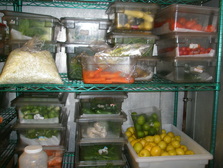
Unlike other green certifications related to buildings, or non-edible products, labels can be particularly misleading. For example:
- "Natural" and "responsibly grown" are generally adjectives any company can use. With no true certification for these types of descriptions in place, a self-made label that claims these doesn't necessarily mean anything.
- USDA Organic is a popular 3rd party certification (which is a good start), though is notoriously expensive, knocking many smaller local farmers that may have better eco-friendly practices out of contention. The label has also faced controversy in the environmental field due to loopholes allowing chemical use, as well as not accounting for ecosystem impacts. For example, you could chop down rainforest to build an organic soybean farm, but is that really "green"?
If you're looking for ways to "green" your menu, try looking at these other qualities instead:
- Locally sourced foods often taste better (due to being fresher) and support local economies. Many top restaurants build partnerships with local growers and suppliers for this reason, so if you do the same, be sure to tell your customers or highlight local items on your menus.
- Fish is heavily impacted by commercial fishing practices, so make sure your seafood checks out on the Monterey Bay Aquarium's Seafood Watch guide.
- Industry-specific certifications are often more custom to the practices of a given product such as coffee, wine, etc. Look for industry standards that involve 3rd party verification and have a good reputation for integrity and environmental protection.
And don't forget about what happens to the food after you buy it. Plan carefully to avoid ordering/throwing away too much food, as well as excess packaging (i.e. individually wrapped items versus bulk). The landfill will thank you!

 RSS Feed
RSS Feed